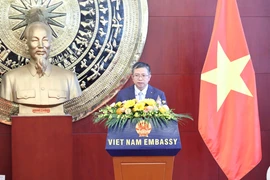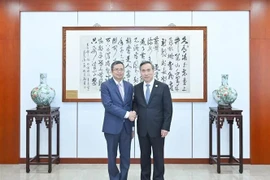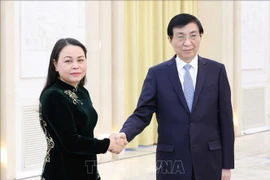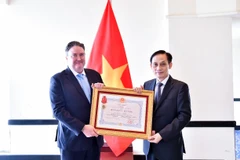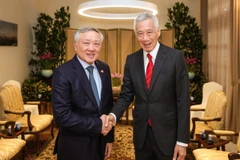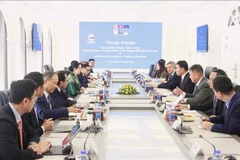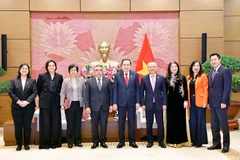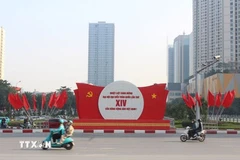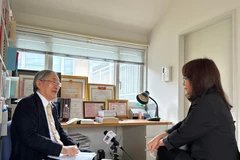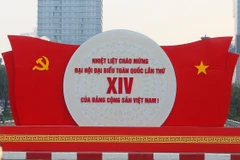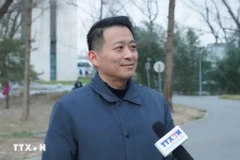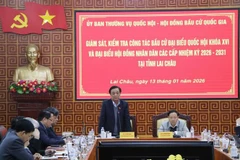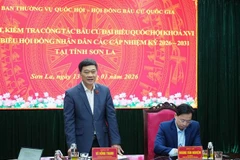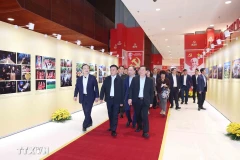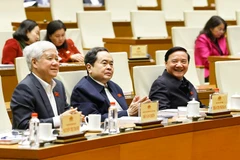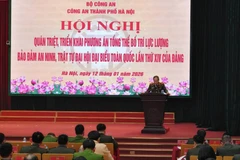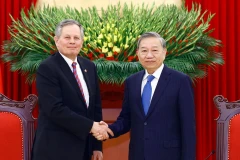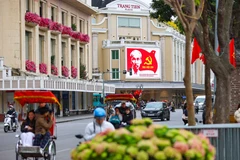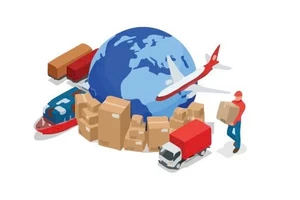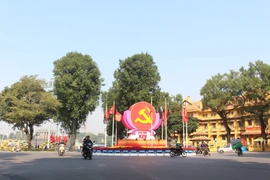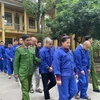Hanoi (VNA) - Chinese Ambassador to Vietnam He Wei on April 28 briefed the Vietnamese press on the practical, strategic and groundbreaking outcomes of the state visit to Vietnam by General Secretary of the Communist Party of China Central Committee and President of China Xi Jinping from April 14-15.
Many practical and strategic outcomes
He said the bilateral cooperation has so far seen new and groundbreaking development steps. Of particular note was the exchange of high-level visits within one year, yielding substantial results.
The building of the Vietnam - China community with a shared future that carries strategic significance has injected fresh impetus into the socialist cause of both countries while contributing to global and regional prosperity.
Pointing to three key highlights of Xi's visit, the diplomat said Vietnam and China have established and upgraded the 3+3 strategic dialogue mechanism between their Ministries of Foreign Affairs, National Defence, and Public Security to the ministerial level. This is the world’s first ministerial-level '3+3' dialogue mechanism, demonstrating the firm mutual support between the two socialist nations in political and security fields, he said.
The second highlight was the launching of a China–Vietnam railway cooperation mechanism, with the formation of a railway cooperation committee between the two governments, marking a critical project of special attention for both sides.
The third, he said, was more humanistic exchanges. The two countries’ shared cultural foundation is rooted in their common pursuit of communist ideals.
With the above outcomes, He called for translating consensus reached by leaders of the two Parties and countries into concrete actions, through strengthening strategic connectivity and deepening infrastructure cooperation to ensure the stability and smoothness of supply chains, while expanding collaboration into emerging sectors such as artificial intelligence (AI) and green development to bring tangible benefits to their people.
With 2025 designated as the Year of China - Vietnam Humanistic Exchange, both countries need to step up exchanges and mutual understanding, promote "red culture" and organise "red journeys" for the youth to study and engage with revolutionary history, fostering closer bonds between their people, he said.
The diplomat suggested increasing coordination to uphold the stability and development of the multilateral trading system centred on the World Trade Organisation (WTO), and contributing to a peaceful and prosperous future for both nations and the broader region.
According to the ambassador, Vietnam has become an increasingly attractive destination for Chinese firms, driven by the stable bilateral relationship and the commitment to building the China - Vietnam community with a shared future that carries strategic significance. Vietnam and China also have geographic proximity and highly complementary economies, coupled with close people-to-people ties.
Stressing China's status as an economic powerhouse with enormous consumer potential and a burgeoning middle class, He said this presents major development opportunities for neighbouring countries, particularly Vietnam.
Two-way trade surpassed 260 billion USD last year, with Vietnamese farm produce like coffee and fresh coconuts becoming highly popular among Chinese consumers. Notably, over 90% of Vietnam’s durian exports were destined for China, significantly boosting incomes for Vietnamese farmers.

To further elevate two-way trade, the ambassador underscored the need to align government strategies and carry out agreed cooperation plans. Key priorities include enhancing infrastructure connectivity through railways, highways, and border crossings, developing "soft connectivity" with smart customs systems to shorten clearance time and reduce logistics costs, leveraging the newly-formed joint railway cooperation committee to advance the construction of cross-border standard-gauge railways, and boosting financial cooperation and greater focus on industrial and technological sectors.
He hoped that Vietnam can draw on China’s experience in pollution management to improve air quality and living conditions for its people, believing that the two countries would expand cooperation into emerging sectors such as AI, semiconductors, and nuclear energy to create broader opportunities that would benefit both countries’ businesses and people.
Strengthening foundation of public support
In his view, both sides need to translate the directions of "strengthening the foundation of public support" from the two Party General Secretaries into practical and effective actions.
In the first quarter of this year, the number of Chinese tourist arrivals to Vietnam exceeded 1.587 million, up 78.3% year on year, once again making China Vietnam's top source of foreign tourists.
Meanwhile, the number of Vietnamese tourists travelling to China also grew rapidly, ranking Vietnam among the top 10 source markets during the May Day holiday. New flight routes launched by airlines from both nations have further facilitated people-to-people and cultural exchanges.
He noted the vibrant locality-to-locality cooperation, with activities such as border friendship exchanges and sport competitions strengthening cultural and closer people-to-people ties./.

